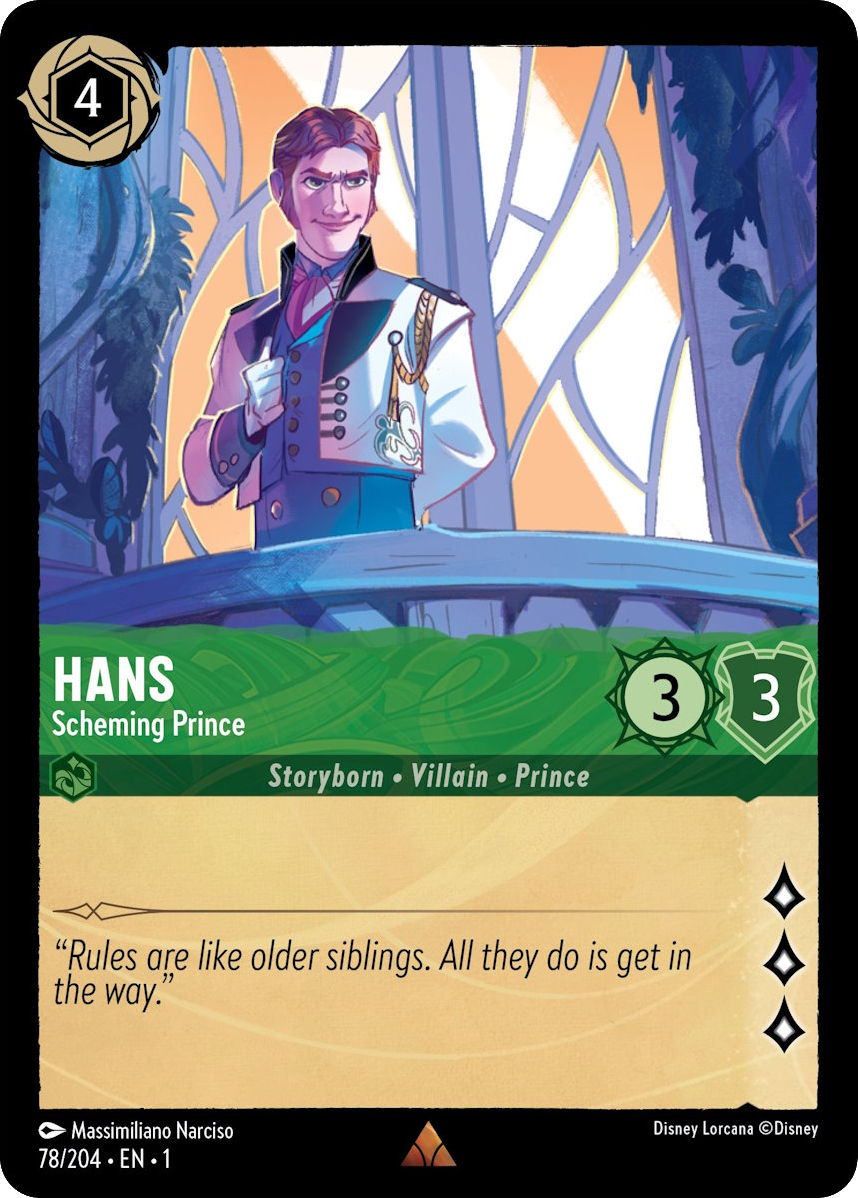
note 7/6/25: i don't really stand by the way i wrote this article any more. the broad strokes points i still agree with, but i think i did a bad job making my points and used some really weird examples. i might rewrite it someday but just know that going in if you want to read this.
recently, the biggest news in the card games scene has been ravensburger, creator of wildly popular 7/10 board game disney villainous (and apparently also the largest manufacturer of puzzles in the us, i just learned that) launching their brand new tcg based on disney's animated pantheon, called lorcana. obviously, with the disney license this game was gonna succeed of the backs of collectors and casual players alone. but when the game was annoucned i saw a lot of speculation within card game communities i frequent that, if they play their cards right and create a geuinely great game, they could absolute cement themselves as a mainstay of the genre in the competitive scene as well, at both the local and premier level. with pokemon and yugioh sequestering all their organized play to dedicated events, allowing major organizers like star city games to run lorcana alongside magic and flesh and blood at major events would drive major competitive interest in the game. and disney if anyone has the money to throw around with regards to prize pools and providing prize and promo support to game stores to drive local play. the intersection of casual players and the aspiration of competitive play would be a perfect winning storm for a game like this, and it's unique situated to do it. all they have to do is get people on board with a truly excellent game.
lorcana is, unfortunately not that game. at least not yet.
lorcana's system mechanics are actually fairly solid. it does have a hard cap of two factions per deck, which i'll hold against any card game, and its "questing" mechanic can lead to some boardstates where one player is able to just build up a board of characters and then use them all at once to win, due to the lack of cards that can be played on your opponent's turn and your main method of interaction only opening up once a creature has quested. but what card game doesn't have system issues? the key is creating designs that emphasize and encourage the intended gameplay and make those rough points less egregious. and well,

so i want to preface this by saying: i don't hate every lorcana card design. there are some actual pretty fun cards and synergies to be discovered here, and there's not 0 variety in the decks people are playing at the top level. but those cards do not make up the majority by any means. looking at all the character cards at uncommon and rare (where you'd expect to start finding some really cool and unique card effects), a vast majority have either no ability, one or two keywords, or one one-sentence tap or static ability. and that last category is the smallest by a fair margin, even at the highest rarity.
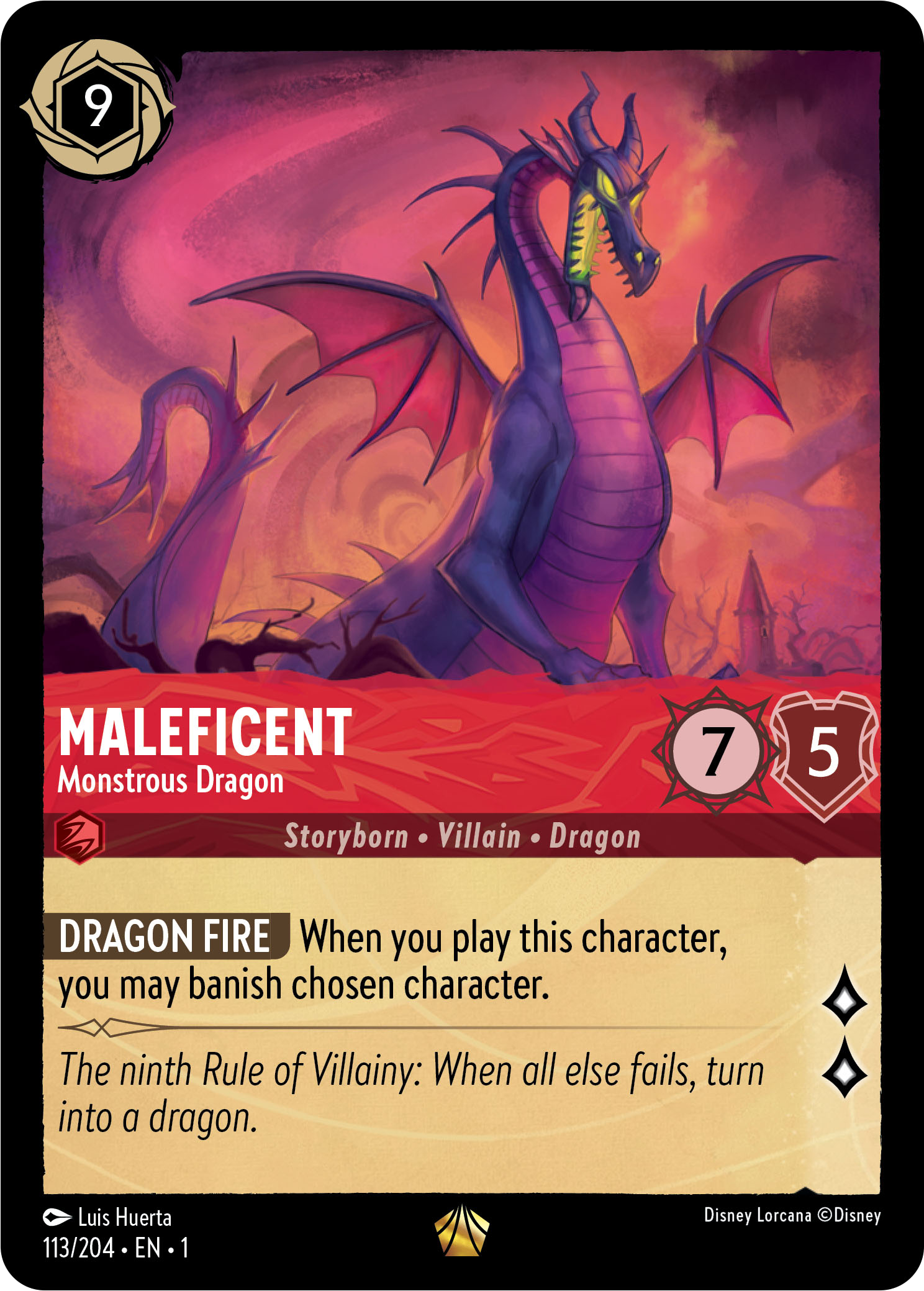
it's easy to understand why they did this. this game has attracted a huge number of people who have never played a card game in their lives, including i'm sure a bunch of actual kids (though at the events i've seen it's been mostly disney adults). but the problem with making a game that's simple to a fault in this way is that it doesn't hook people.
for the sake of example, i'm going to look at another licensed trading card game with an audience of children and inexperienced players that appeals primarily to collectors: the pokemon tcg.
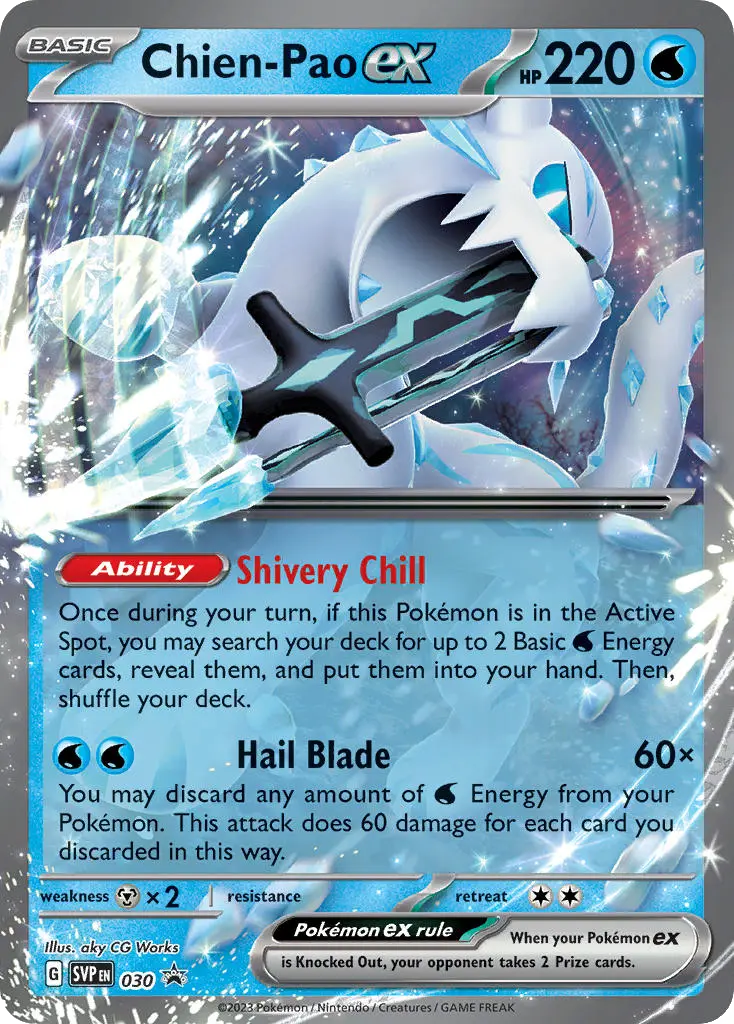
one of the keys to creating a good card game is player agency. due to the inherent nature of a shuffled deck of cards, a card game can never be an expression of pure player skill. but the skill expression of these games comes in being able to take a given hand of cards and maneuver your way to a win using whatever you're given. different games enable this in different ways, but the key is always giving players decision points of what cards to play and what to do with them, and thereby giving people the opportunity to play something well or poorly.
decks in the pokemon tcg vary in terms of their strategy. chien-pao, the deck i play, is a little more on the linear side. you have a boardstate that serves as your goal in a game: a chien-pao in the active spot to let you get energies into your hand and dump all of them into guaranteed one-hit-kos, a baxcalibur on your bench to enable you to play out as many energies as you need, and superior energy retrieval in your hand or origin palkia vstar on your bench to let you recover a grip of energies when you're out in your deck or you need to take down an especially big enemy. in any given game, this is what you're aiming for, but depending on the match you may need to adapt this strategy, to play around your draw or what your opponent is doing to disrupt you.
pokemon is all about tutors, often one-for-one ways to search your deck are abundant and incredibly important. cards like nest ball and ultra ball are key parts of a wide variety of decks. decks will also play different tutors depending on their deck's needs and synergies, like irida in the case of chien-pao. the consistency afforded by these tutors may seem like it trivializes setting up these "optimal boardstates", but at the end of the day you are still beholden to your opening draw, and the way you use the tutors you do have will change depending on the matchup and what else is in your hand. the prize card mechanic changes this math as well, especially in decks that play one ofs (and most decks to, to some degree). when six random cards are removed from your deck at the start of the game, you'll need to adapt your plans on the fly. optimal play in pokemon is all about knowing what cards can find what other cards, and complex lines and sequencing that allow you to end up where you want to be.
of course the game isn't fully solitaire. deckbuilding in pokemon is all about balancing consistency with silver-bullet cards and utility. cards like canceling cologne, lost vacuum and manaphy are essential for countering different cards and strategies, and cards like path to the peak (my beloathed) and spiritomb can force an answer from your opponent in certain matchups. depending on your suite of tutors, you can set yourself up to be able to find these cards when you need them. however, the more silver bullets and interaction you include in your deck, the less consistent you make your core game plan, which is the important balancing act of deckbuilding in pokemon. many decks are even fully built around matchup-specific threats and one-ofs, like lost zone box, the current best deck in the format, and other "box" decks like zoroark box and counter box. decks like these have very high skill ceilings, with a good player being able to look at their hand, see what's prized, and see what their opponent has and the deck they're playing, and come up with a strategy using what they have available.
a turn in pokemon involves a lot of decision making. between tutoring, wheeling, using supporting rummage effects like kirlia and radiant greninja, and cards that let you draw up when you have few cards in your hand, making you decide how much you're willing to get rid of in order to draw a new hand, like bibarel, you're always thinking about the odds of getting what you need on a given turn, and what you're willing to bet you won't need in the future. it's a game that rewards knowledge of the meta and especially experience piloting your deck, in a way that's satisfying both for experienced pro players as well as casual players who get their first taste of deck expertise through playing at local events.
the other thing you might notice about these cards, though, is that none of them are all that complicated. none of these cards do more than 2 things (most only do 1), and those things are easy to remember and wrap your head around: even chien-pao, who has a full ability and an attack with a notable effect, is pretty intuitive. to me this is where the excellence of pokemon's game design shines through, even a couple of kids can pick up some decks and understand what all the cards do and what you're supposed to use them for, but you'll still be discovering new lines and ways to play around your opponent's disruption with a well built deck even after playing it a hundred times.
this depth doesn't just extend to the top-tier tournament cards either! after all, while fostering a vibrant tournament scene is important, most people who play your game are going to be casual players who just open a few packs. great card games will design their cards to appeal to even those players. for the sake of example, let's take this junk rare that i opened today out of a pack of the most recent set, obsidian flames.
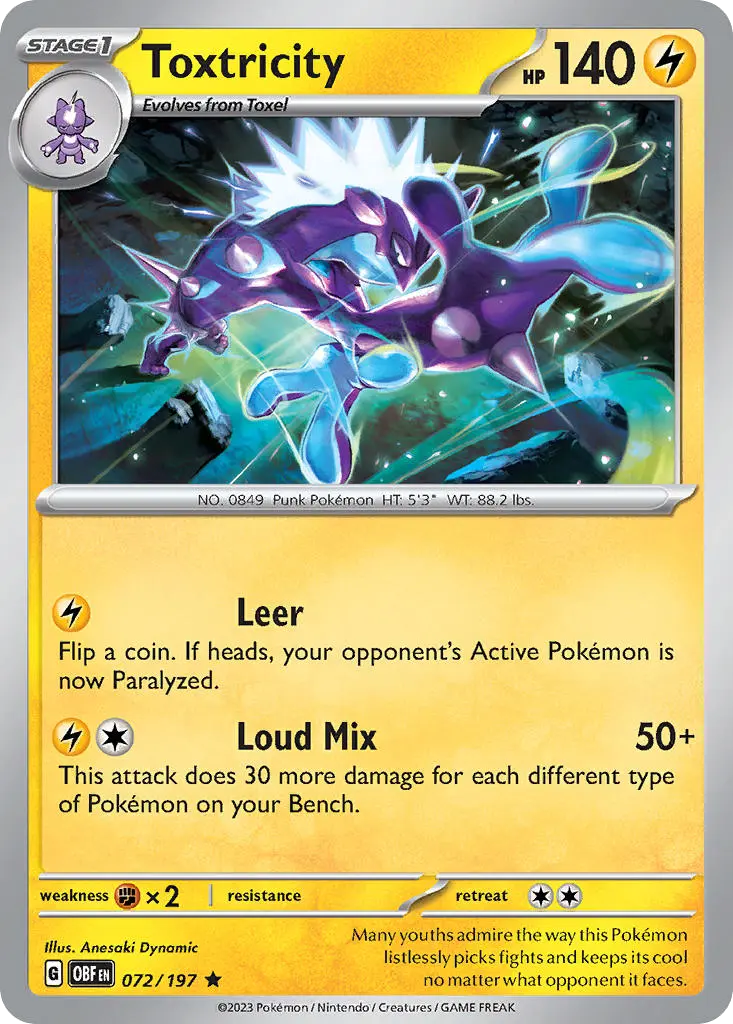
this card isn't great. it's not even especially playable. but what it is is aspirational. loud mix has a very simple effect, but it asks you to build your deck in a unique way: most decks won't have more than one or two types represented, and many decks want to keep spots on their bench empty. not only does this toxtricity serve as an alluring deckbuilding challenge for a casual player (and one that can probably use a lot of the cards they already own), but it gives them an "ideal boardstate" to aim for just like chien-pao or mew or gardevoir or any of the other format-defining archetypes, and so has the same room for skill expression and rewarding a player experienced with their own deck.
a great card game can (and should) be a medium for expression and creativity: the whole benefit of the genre is that all these unique game pieces can be combined and played with and against each other in near limitless ways. a great card game will reward a player who experiments and tries out a unique strategy- if they find one that works in the meta. so many long-running card games will have incredibly powerful decks that go essentially undiscovered for months, even years at a time. all the pieces were there, they just needed someone creative and driven enough to find the right way to combine them. cards like toxtricity often won't end up being anything special, but they still have unique effects, something that can capture a deckbuilder's imagination and maybe even allow them discover some cool new strategies and combos, perhaps even using some older overlooked cards. if you're not enabling this creativity, i question the point of creating a card game in the first place.
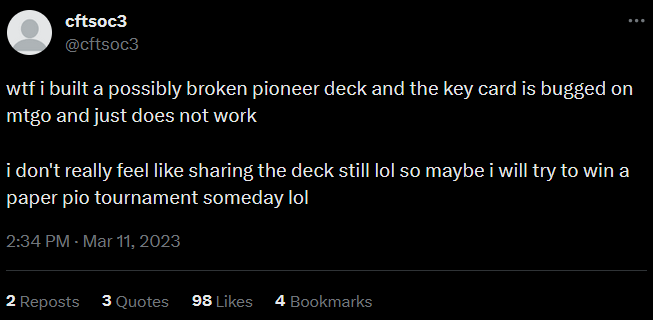
this is my real largest problem with lorcana. sure, it's the first set, and the card pool can only become more interesting from here. but i'd argue that having more unique effects is even more important in the first set while there's a smaller card pool: when even top tier decks are having to fill in their curve with vanilla characters (cards with no abilities) just to make playables, your game isn't going to hook players in and make them interested in the future sets that add more depth, because they'll simply stop playing before that happens.
what makes this especially frustrating is how much room lorcana's system mechanics leave for simple, but still unique effects. every character has multiple subtypes, a cost, and three different stats that matter on the board. each one has multiple different things it can do while it's on the board: challenge, quest, sing a song, even just hang back and wait for one big turn of questing. there's so many things you can care about players doing here. going back to toxtricity as an example, caring about a variety of different types is something that players intuitively understand, and every pokemon in the game can contribute to it, so it's a perfect choice for a simple effect. lorcana is jam packed with things the cards could check for or synergize with that is just left on the table. and the unique effects that do exist are excellent! they do exactly this, caring about card types, character types, keywords, system mechanics like counting cards in your hand or inkwell, even some fun spell effects like "ritualing" in a character. there's just nowhere near enough of them to combine in fun ways and create a deep and compelling experience.
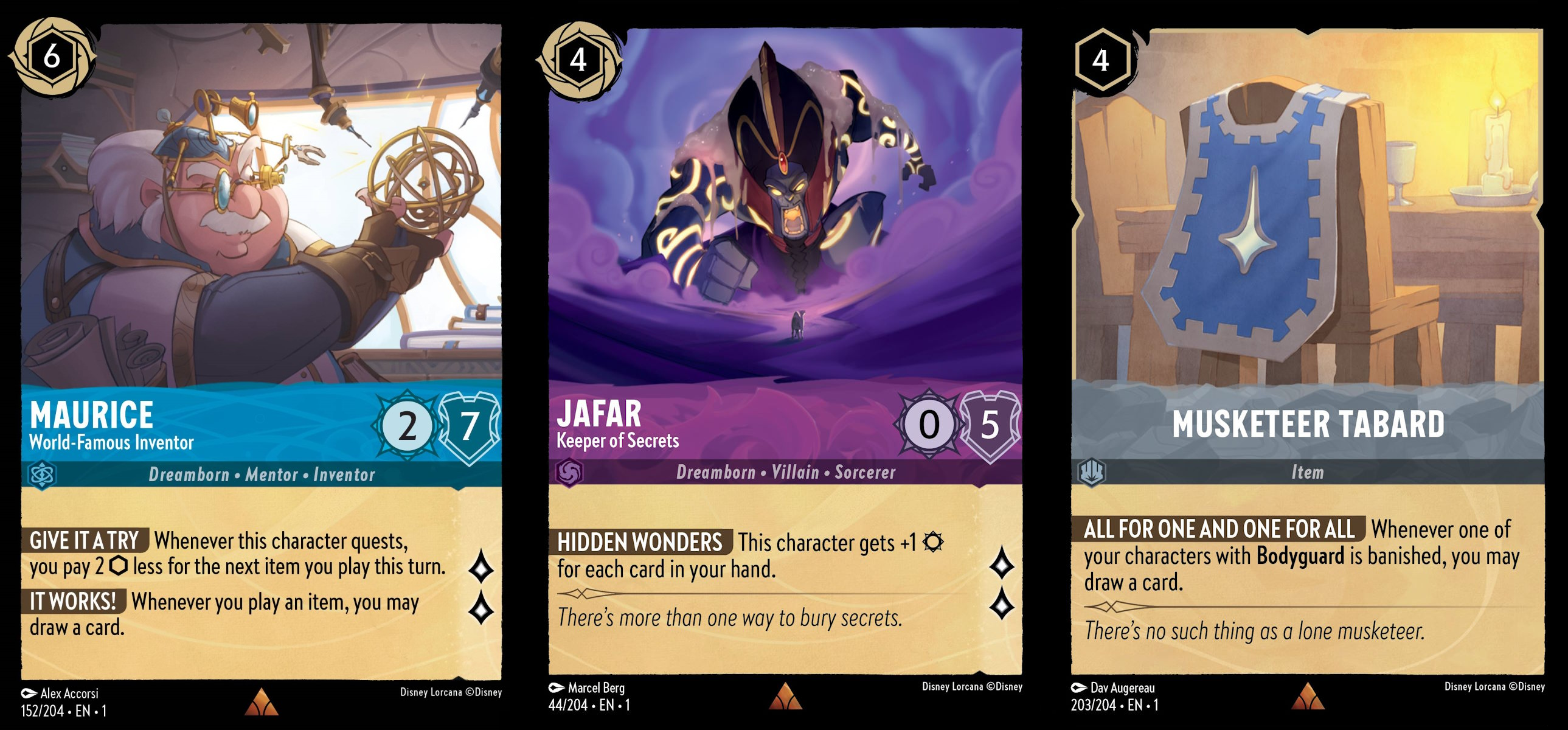
not every game needs pokemon's level of tutoring and card flow to be a great game. hell, i still like magic more than pokemon overall, and that's a game where any sort of card selection or draw requires a real cost. but you need room for players to have agency and creativity, both in deck building and in gameplay. and to do that, you need cards that do stuff. you need to design cards that ask things of the player, or have unique effects to help them get there. you need opportunities for players to misplay that aren't just baked into the system mechanics, and you need decks that play meaningfully different from each other to make for a compelling metagame, even at a local, casual level.
despite my cynicism about disney as a cultural institution, i really do want this game to succeed. they've done a great job with the flavor and the core mechanics, and it's obviously a big hit with collectors (though i do wish they would print more fucking cards so people can actually play it). but more than that i think more competition in the tcg scene is always a positive, it's one of the reasons i've turned around so much on flesh and blood (i could maybe write a whole article on that game). but right now it feels to me like the designers kind of phoned in the introduction to their game, and i worry that prospective players will be turned off by that. you can make a game that's simple and approachable but not to a fault: i'd even argue they did this with villainous already! it's just a matter of putting in the design muscle and testing to create a set of cards that can give players a true sandbox to play and discover in. that's what making a great card game is all about.
also, because i know people would bring it up, yes i have played marvel snap, yes that's an excellent example of a simple but deep game, but i didn't want to bloat this article with examples too much. i might write a dedicated article on it eventually.
